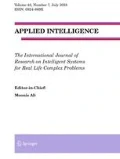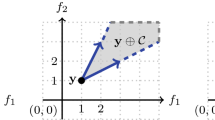Abstract
The characteristics of randomness, running style, and unpredictability of user requirements in the cloud environment, brings great challenges to task scheduling. Meanwhile, the scheduling efficiency of cloud task allocation is an important factor affecting cloud resource systems. Therefore, this paper takes into account the characteristics of tasks, systems and users, a many-objective task scheduling model was constructed in cloud computing. In order to better solve the proposed many-objective task scheduling model, a reference vector guided evolutionary algorithm based on angle-penalty distance of normal distribution (RVEA-NDAPD) is proposed, and compared with the existing standard many-objective evolutionary algorithms (MaOEAs). Simulation results show that the algorithm can effectively improve the performance of the proposed model in cloud computing and obtain a suitable task allocation strategy.







Similar content being viewed by others
References
Angiuoli SV, Matalka M, Gussman A, Galens K, Fricke WF (2011) CloVR: A virtual machine for automated and portable sequence analysis from the desktop using cloud computing. Bmc Bioinformatics 12(1):356
Liu Y (2013) Uncertain random variables: a mixture of uncertainty and randomness. Soft Comput 17(4):625
Kong X, Lin C, Jiang Y, Yan W, Chu X (2011) Efficient dynamic task scheduling in virtualized data centers with fuzzy prediction. J Netw Comput Appl 34(4):1068
Hosseinimotlagh S, Khunjush F, Samadzadeh R (2015) SEATS: smart energy-aware task scheduling in real-time cloud computing. J Supercomput 71(1):45
He H, Xu G, Pang S, Zhao Z (2016) AMTS: Adaptive multi-objective task scheduling strategy in cloud computing. China Commun 13(4):162
Lin R, Qiang L (2016) Task scheduling algorithm based on Pre-allocation strategy in cloud computing. In: IEEE International conference on cloud computing and big data analysis (ICCCBDA) (IEEE), pp 227–232
Mittal S, Singh S, Kaur R (2016) Enhanced round robin technique for task scheduling in cloud computing environment. Int J Eng Tech Res V5(10):525–529
Elzeki O, Reshad M, Abu Elsoud M (2012) Improved max-min algorithm in cloud computing. Int J Comput Appls 50(12):22
Song B, Hassan MM, Huh EN (2010) A novel heuristic-based task selection and allocation framework in dynamic collaborative cloud service platform. In: 2010 IEEE second international conference on cloud computing technology and science. pp 360–367
Tawfeek MA, El-Sisi A, Keshk AE, Torkey FA (2014) Cloud task scheduling based on ant colony optimization. In: 2013 8th International conference on computer engineering systems (ICCES) (IEEE). pp 64–69
Li K, Xu G, Zhao G, Dong Y, Dan W (2011) Cloud task scheduling based on load balancing ant colony optimization. In: Sixth annual chinagrid conference (IEEE), vol 2011, pp 3–9
Dong M, Fan L, Jing C (2019) ECOS: An efficient task-clustering based cost-effective aware scheduling algorithm for scientific workflows execution on heterogeneous cloud systems. J Syst Softw 110405:158
Devaraj AFS, Elhoseny M, Dhanasekaran S, Lydia EL, Shankar K (2020) Hybridization of firefly and Improved Multi-Objective Particle Swarm Optimization algorithm for energy efficient load balancing in Cloud Computing environments. J Parallel Distrib Comput 142:36
Gupta A, Bhadauria HS, Singh A (2020) Load balancing based hyper heuristic algorithm for cloud task scheduling. Journal of Ambient Intelligence Humanized Computing
Zhou Z, Li F, Zhu H, Xie H, Abawajy JH, Chowdhury MU (2020) An improved genetic algorithm using greedy strategy toward task scheduling optimization in cloud environments. Neural Comput Applic 32 (6):1531
Fan Y, Liang Q, Chen Y, Yan X, Zeng D (2016) Executing time and cost-aware task scheduling in hybrid cloud using a modified de algorithm. In: International symposium on intelligence computation and applications (Springer), pp 74–83
Juhnke E, Dörnemann T, Böck D, Freisleben B (2011) Multi-objective scheduling of BPEL workflows in geographically distributed clouds. In: IEEE 4th International conference on cloud computing (IEEE), vol 2011, pp 412–419
Lavanya M, Shanthi B, Saravanan S (2020) Multi objective task scheduling algorithm based on SLA and processing time suitable for cloud environment. Comput Commun 151:183
Al-Maytami BA, Fan P, Hussain A, Baker T, Liatsist P (2019) A task scheduling algorithm with improved makespan based on prediction of tasks computation time algorithm for cloud computing. IEEE Access 160916:7
Raj G (2012) Effective cost mechanism for cloudlet retransmission and prioritized VM scheduling mechanism over broker virtual machine communication framework. Int J Cloud Comput Serv Arch 2(3):41
Su S, Li J, Huang Q, Huang X, Shuang K, Wang J (2013) Cost-efficient task scheduling for executing large programs in the cloud. Parallel Comput 39(4-5):177
Himani, Sidhu HS (2015) Cost-deadline based task scheduling in cloud computing. In: Second international conference on advances in computing and communication engineering (ICACCE) (IEEE), vol 2015, pp 273–279
Panda SK, Jana PK (2019) Load balanced task scheduling for cloud computing: a probabilistic approach. Knowl Inf Syst 61:1607–1631
Lin W, Peng G, Bian X, Xu S, Chang V, Li Y (2019) Scheduling algorithms for heterogeneous cloud environment: main resource load balancing algorithm and time balancing algorithm. J Grid Comput 17(4):699
Ghomi EJ, Rahmani AM, Qader NN (2019) Service load balancing, task scheduling and transportation optimisation in cloud manufacturing by applying queuing system. Soft Comput 13(6):865
Jacob P, Pradeep K (2019) A multi-objective optimal task scheduling in cloud environment using cuckoo particle swarm optimization. Wirel Pers Commun 109:315–331
Senthil Kumar AM, Venkatesan M (2019) Multi-objective task scheduling using hybrid genetic-ant colony optimization algorithm in cloud environment. Wirel Pers Commun 107: 1835–1848
Liu C, Zou C, Wu P (2014) A task scheduling algorithm based on genetic algorithm and ant colony optimization in cloud computing. In: 2014 13th International symposium on distributed computing and applications to business, engineering and science (IEEE), pp 68–72
Li Y, Li S, Gao S (2016) Cloud task scheduling based on chaotic particle swarm optimization algorithm. In: International conference on intelligent transportation, big data & smart city (ICITBS), vol. 1 (IEEE Computer Society), vol 1 , pp 493–496
Kumar AMS, Venkatesan M (2019) Multi-objective task scheduling using hybrid genetic-ant colony optimization algorithm in cloud environment. Wirel Pers Commun 107(4):1835
Zou D, Wang F, Yu N, Kong X (2019) Solving many-objective optimisation problems by an improved particle swarm optimisation approach and a normalised penalty method. Int J Bio-Inspir Comput 14 (4):247
Ojha M, Singh KP, Chakraborty P, Verma S (2019) A review of multi-objective optimisation and decision making using evolutionary algorithms. Int J Bio-Inspir Comput 14(2):69
Okosun K, Makinde O (2019) Mathematical model of childhood diseases outbreak with optimal control and cost effectiveness strategy. Int J Comput Sci Math 10(1):115
Safi HH, Ucan ON, Bayat O (2020) An efficient multi-objective memetic genetic algorithm for medical image handling and health safety to support systems in medical internet of things. J Med Imaging Health Inform 10(1):194
Ghadimi B, Nejat A, Nourbakhsh SA, Naderi N (2019) Multi-objective genetic algorithm assisted by an artificial neural network metamodel for shape optimization of a centrifugal blood pump. Artif Organs 43(5):E76
Hugo A, Makinde OD, Kumar S (2019) An eco-epidemiological model for newcastle disease in central zone tanzania. Int J Comput Sci Math 10(3):215
Cui Z, Du L, Wang P, Cai X, Zhang W (2019) Malicious code detection based on CNNs and multi-objective algorithm. J Parallel Distrib Comput 129:50
Cai X, Niu Y, Geng S, Zhang J, Cui Z, Li J, Chen J (2020) An under?sampled software defect prediction method based on hybrid multi?objective cuckoo search. Concurrency Computat Pract Exper 32:e5478
Wang H, Fang D, Wang C, Jin J (2019) An image hole inpainting algorithm with improved FMM for mobile devices. Inter J Comput Sci Math 10(3):236
Tapaswini S, Chakraverty S (2019) Numerical solution of fuzzy differential equations using orthogonal polynomials. Int J Comput Sci Math 10(1):32
Wang P, Huang J, Cui Z, Xie L, Chen J (2019) A gaussian error correction multi-objective positioning model with NSGA-II. Concurrency and Computation: Practice and Experience 32:e5464
Phaneendra K, Mahesh G (2019) Fourth order computational method for two parameters singularly perturbed boundary value problem using non-polynomial cubic spline. Int J Comput Sci Math 10(3):261
Azad P, Jafari N, Navimipour, Hosseinzadeh M (2019) A fuzzy-based method for task scheduling in the cloud environments using inverted ant colony optimisation algorithm. Int J Bio-Inspir Comput 14 (2):125
Cai X, Wang P, Du L, Cui Z, Zhang W, Chen J (2019) Multi-objective three-dimensional DV-hop localization algorithm with NSGA-II. IEEE Sensors J 19(21):10003
Gilbert EPK, Baskaran K, Rajsingh EB, Lydia M, Selvakumar AI (2019) Trust aware nature inspired optimised routing in clustered wireless sensor networks. Int J Bio-Inspir Comput 14(2):103
Cui Z, Xue F, Zhang S, Cai X, Cao Y (2020) A hybrid blockchain-based identity authentication scheme for multi-WSN. IEEE Transactions on Services Computing 13(2):241–251
Cui Z, Xu X, Xue F, Cai X, Cao Y, Zhang W, Chen J (2020) Personalized recommendation system based on collaborative filtering for IoT scenarios. IEEE Transactions on Services Computing 13 (4):685–695
Wang Y, Cui Z, Li W (2019) A novel coupling algorithm based on glowworm swarm optimization and bacterial foraging algorithm for solving multi-objective optimization problems. ALgorithms 12(3):61
Cui Z, Zhang J, Wang Y, Cao Y, Cai X, Zhang W, Chen J (2019) A pigeon-inspired optimization algorithm for many-objective optimization problems. Sci China Inf Sci 070212:62
Cai X, Zhang M, Wang H, Xu M, Chen J, Zhang W (2019) Analyses of inverted generational distance for many-objective optimisation algorithms. Int J Bio-Inspir Comput 14(1):62
Cui Z, Chang Y, Zhang J, Cai X, Zhang W (2019) Improved NSGA-III with selection-and-elimination operator. Swarm Evol Comput 49:23
Cheng R, Jin Y, Olhofer M, Sendhoff B (2016) A reference vector guided evolutionary algorithm for many-objective optimization. IEEE Trans Evol Comput 20(5):773
Deb K, Thiele L, Laumanns M, Zitzler E (2005) Scalable test problems for evolutionary multiobjective optimization. Scalable Test Problems for Evolutionary Multiobjective Optimization (Springer)
Bosman P, Thierens D (2003) The balance between proximity and diversity in multiobjective evolutionary algorithms. IEEE Trans Evol Comput 7(2):174
Ishibuchi H, Imada R, Setoguchi Y, Nojima Y (2018) Reference point specification in inverted generational distance for triangular linear pareto front. IEEE Trans Evol Comput 22(6):961
Yang S, Li M, Liu X, Zheng J (2013) A grid-based evolutionary algorithm for many-objective optimization. IEEE Trans Evol Comput 17(5):721
Deb K, Jain H (2014) An evolutionary many-objective optimization algorithm using reference-point-based nondominated sorting approach, part I: solving problems with box constraints. IEEE Trans Evol Comput 18(4):577
Wang R, Purshouse RC, Fleming PJ (2013) Preference-inspired coevolutionary algorithms for many-objective optimization. IEEE Trans Evol Comput 17(4):474
Cui Z, Zhang J, Wu D, Cai X, Wang H, Zhang W, Chen W (2020) Hybrid many-objective particle swarm optimization algorithm for green coal production problem. Inf Sci 518:256
He Z, Yen G (2017) Many-objective evolutionary algorithms based on coordinated selection strategy. IEEE Trans Evol Comput 21(2):220
Calheiros RN, Ranjan R, Beloglazov A, Rose CAFD, Buyya R (2010) CloudSim: a toolkit for modeling and simulation of cloud computing environments and evaluation of resource provisioning algorithms. Soft Pract Exp 41(1):23
Shi Y, Shao Y, Zhou Z, Zhang H, Chen Y, Cui L (2016) Pricing model of privacy preserving service based on pareto optimization. Chinese J Comput 39:1267
Acknowledgements
This work is supported by Key R&D program of Shanxi Province (High Technology) under Grant No. 201903D121119, the National Natural Science Foundation of China under Grant No.61806138.
Author information
Authors and Affiliations
Corresponding author
Ethics declarations
Conflict of interests
The authors declare no conflict of interest
Additional information
Publisher’s note
Springer Nature remains neutral with regard to jurisdictional claims in published maps and institutional affiliations.
Rights and permissions
About this article
Cite this article
Xu, J., Zhang, Z., Hu, Z. et al. A many-objective optimized task allocation scheduling model in cloud computing. Appl Intell 51, 3293–3310 (2021). https://doi.org/10.1007/s10489-020-01887-x
Published:
Issue Date:
DOI: https://doi.org/10.1007/s10489-020-01887-x




